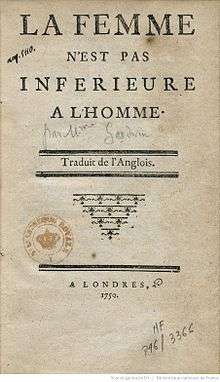Madeleine de Puisieux
Madeleine d'Arsant de Puisieux (1720–1798), was a French writer and active feminist.

Madeleine de Puisieux | |
|---|---|
| Born | November 28, 1720 Paris, France |
| Died | 12 April 1798 (aged 77–78) Paris, France |
Life
Madeleine de Puisieux, was born in Paris on November 28, 1720. Although not much is known about her early life, Puisieux worked to become a published author. In 1745, she achieved her goal and with the help of her friend, Denis Diderot[1] she published one of her first works entitled Les Caractères sometime in the year 1750.[2]
Puisieux also published one of her most famous works later that year entitled, La Femme n'est pas inférieure à l'homme ("Woman is not inferior to man"). This was a publication of a previously anonymous piece where Puisieux translated and brought up topics in the book about the equality of sexes.[3] She based these questions found in the 1405 publication, La Cité des dames (The City of ladies) by Christine de Pisan. The following year, it was republished under the title Le Triomphe des dames (The Triumph of the ladies.) It is sometimes debated whether Puisieux's future husband Philippe-Florent de Puisieux (1713–1772) helped Puisieux with the translations used in the final publication.[4]
Born on November 28, 1713 and died in October 1772, Philippe was the French ambassador to Switzerland. Among other formalities, he was also a well-known lawyer at the Paris parliament. In the year 1750, Madeleine de Puisieux met and fell in love with Philippe-Florent de Puisieux, eventually marrying him.[5]
Achievements
Throughout her relationships, Puisieux had no children. She however did seek opportunities to help the younger generation of girls by publishing advice books for girls.[6] This made her name a well-known one among the population as Puisieux wanted to encourage girls to know about gender equality with feminism as her platform of teaching.
With the wide known success of her works, Puisieux was recognized by the late, Louis XV. After his death in 1774, she settled down with her husband and was awarded a state pension in 1795.[2]
Death
On April 12, 1798, Madeleine de Puisieux died in her hometown in Paris at the age of 77 years old.[7]
Relationship with Denis Diderot
Madeleine de Puisieux had a relationship with longtime and fellow philosopher, art critic, Denis Diderot from 1746 to 1755. During that time she was a mistress. Although never married, she was the kept woman to Diderot during their time together. In that time, they worked together on some of Puisieux's works as he helped get the works published. Puisieux was not the only mistress to Diderot. She shared the title with Sophie Volland, and Mme de Maux.[1]
Works
- Alzarac, ou La nécessité d'être inconstant, Cologne, Paris, Charpentier, 1762
- Conseils à une amie, Amsterdam, Aux dépens de la Compagnie, 1751
- Histoire de Mademoiselle de Terville, Amsterdam, Veuve Duchesne, 1768
- Le Goût de bien des gens, ou, Recueil de contes, tant en vers qu'en prose, Amsterdam, Changuion, 1769
- Le Plaisir et la volupté : conte allégorique, Paphos, [s.n.], 1752
- L'Éducation du marquis de *** ou Mémoires de la comtesse de Zurlac, Berlin, Fouché, 1753
- Les Caractères, Londres [Paris], S.n., 1750–1751
- Mémoires d'un Homme de Bien, Paris, Delalain, 1768
- Réflexions et avis sur les défauts et les ridicules a la mode. Pour servir de suite aux conseils à une amie, Paris, Brunet, 1761
- Zamor et Almanzine, ou L'inutilité de l'esprit et du bon sens, Amsterdam, Hochereau l'aîné, 1755
References
- Durant, Will. The Story of Civilization Volume 9:The Age of Voltaire. Simon&Schuster. pp. 624, 675–6.
- Kinsey, Susan (1978). Madeleine de Puisieux: ethical egoism in the search for happiness. Columbia University.
- Hayes, Julie (2015). Studies in Eighteenth-century Culture. Vol. 44. Johns Hopkins University Press.
- Spencer, Samia (2005). Writers of the French Enlightenment. Farmington Hills. ISBN 0-787681318.
- Garnier, Camille (1978). Madame de Puisieux, moraliste et romancière(1720-1798). Indiana University.
- Berenguier, Nadine. Conduct Books for Girls in Enlightenment France. ISBN 1409478580.
- Laborde, Alice. Diderot et Madame de Puisieux. Saratoga: ANMA Libri. ISBN 0-915838-54-0.